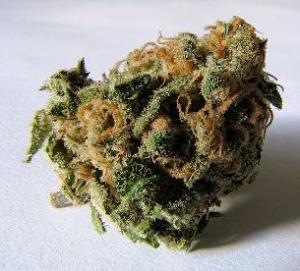It's a historic day. Marijuana possession is now legal in Washington state, and will be in Colorado, too, within a few weeks.
Nonprofits including those in drug policy reform face continuing challenges in the tough economic environment. That means StoptheDrugWar.org and Drug War Chronicle need your support to do our job in 2013.
Yes, it's true: Medical marijuana dispensaries really are coming in Arizona and New Jersey, and clinics to Massachusetts. Meanwhile, Harborside wins in state court, and Mendocino County ponders a federal subpoena. There's more news, too.
25 to life for drug possession? Not anymore, not under California's now amended Three Strikes law. The first drug prisoner to be released after voters approved Prop 36 last month is now a free man.
Yet another poll shows that support for marijuana legalization has reached the tipping point.
The CBS News poll is reporting its highest levels yet of support for marijuana legalization, with the country now evenly divided.
A new poll provides more evidence that support for marijuana legalization is becoming the new norm in both Canada and the United States.
Yet another poll with majority support for marijuana legalization, and this time the pollster says it's "just a matter of time."
Some Colorado business groups are urging Attorney General Holder to enforce federal marijuana laws in Colorado. Read on to see the complete list of these groups trying to subvert the will of the voters.
A US Coast Guard petty officer was killed trying to intercept a Mexican smuggling craft just off the Southern California coast Sunday. He becomes the 61st person to die in US drug law enforcement operations so far this year.
Greed strikes down a pair of cops, including a Bay Area drug task force commander, and two more go down because of dope habits they picked up along the way.
As of today, Thursday, December 6, 2012, marijuana possession is legal in the state of Washington. Under the I-502 initiative passed by the state's voters last month, adults 21 and older can now legally possess up to an ounce of marijuana (or 16 ounces of marijuana-infused edibles) without fear of arrest or criminal prosecution.

King 5 news report (nwcn.com)
The date comes just one day after the
80th anniversary of the end of alcohol Prohibition and could mark the beginning of the end for marijuana prohibition in the United States. Colorado voters also legalized marijuana, and it will be legal to possess an ounce there -- and grow up to six plants -- sometime between now and January 5, the last day the governor has to ratify the November election results.
Alaska had been the only state to allow the possession of small amounts of marijuana. But, citing the state constitution's privacy protections, Alaska courts found that right only existed in the privacy of one's home.
Emboldened by the popular vote in Colorado and Washington, legislators in at least four states so far have now filed or will soon file marijuana legalization bills, with more to follow. And in states where the initiative process is allowed, activists are chomping at the bit in a race to be the next to legalize it at the ballot box (although they may want to wait for 2016, when the presidential race increases liberal turnout). And a spate of public opinion polls released since the election show support for legalization nationwide now cracking the 50% barrier.
While the federal government may attempt to block efforts to tax and regulate legal marijuana commerce in the two states, it cannot block them from removing marijuana offenses from their criminal codes. Nor can it make them reinstate them. News reports have noted that the federal government has
no plans to intervene in Washington state's legalization today.
I-502 isn't a free for all. It remains a criminal offense to grow or distribute marijuana, and the state-licensed producers and stores for legal cultivation and sales and regulations governing them are a year away. There is no way in the meanwhile to legally buy marijuana. You can't smoke it in public (though that proscription is
unlikely to hold for today at least), or drive in a vehicle with a lit joint (an offense equivalent to open container laws). If you live or work on federal property, you are still subject to federal drug laws. And if you're under 21, you're out of luck.
But, those caveats aside, pot possession is legal today in Washington, with sales and production coming, and that's a big deal.
"Washington state and Colorado made history on Election Day by becoming not just the first two states in the country -- but the first political jurisdictions anywhere in the world -- to approve the legal regulation of marijuana," said Ethan
Nadelmann, executive director of the
Drug Policy Alliance. "The only way federal marijuana prohibition is going to end is by voters and legislators in other states doing just what folks in those two states just did."
"This is incredibly significant," said freshly minted
Marijuana Policy Project communications director Mason
Tvert, who just took the job after leading the Colorado Amendment 64 campaign to victory. "This is having a major impact on public perceptions and is showing that times are changing and a majority of people in various areas are ready to take these steps."
"This is the single most important event that has occurred in 75 year of marijuana prohibition," said Keith
Stroup, founder and currently counsel for
NORML, the National Organization for the Reform of Marijuana Laws. "The change in the perception of what is possible has been dramatic. Now, elected officials and state legislatures all over the country are honestly considering the option of tax and regulate where before November that was generally perceived as a radical proposal."
The election results are shifting the parameters of the discussion, the silver-haired attorney and activist said.
"Several states are considering full legalization now, and that makes decriminalization sound like a moderate step, which could work in a lot of Southern and Midwestern states where they're perhaps not quite ready yet to set up a regulated market,"
Stroup pointed out. "The context of the public policy debate has totally changed as a result of Colorado and Washington. It's as dramatic as anything I've witnessed in my lifetime."
While reformers are elated, author and marijuana scholar Martin Lee had a slightly more sober assessment.
"It's way too early to tell whether I-502 in Washington state signals the death knell of marijuana prohibition in the United States," said Lee, who recently published
Smoke Signals: A Social History of Marijuana -- Medical, Recreational, and Scientific.
"The cultural momentum in the United States favors marijuana legalization, but the political response, thus far, has been lagging," Lee noted. "Political change can sometimes happen very quickly -- think of the sudden demise of Soviet Bloc Communism after the Berlin Wall unexpectedly toppled in 1989. Swift, dramatic change seems possible with respect to cannabis prohibition, which is based on lies and could collapse like a house of cards. But powerful political interests in the United States -- in particular law enforcement -- have long benefited from the war on drugs and they are reluctant to throw in the towel."
Lee also raised the specter of law enforcement retaliation, especially against some of its easiest targets.
"My biggest concern is that the new state law in Washington will do little to prevent or discourage law enforcement from selectively targeting and harassing young people, especially young African-Americans and Latinos. Racial profiling is endemic in Washington state and throughout the United States," he said.
"It's also disconcerting that I-502 includes a zero tolerance provision for under 21-year-old drivers, who could be punished severely if blood tests show any trace of THC metabolites (breakdown products) in their system. Because THC metabolites can remain in the body for four weeks or longer, blood and urine tests for marijuana can't measure impairment. What's to stop law enforcement in Washington from randomly testing and arresting minority youth under the guise of public safety?"
It remains to be seen just how the
DUID provision will work out, either for young drivers or for drivers over 21, who face a presumption of impaired driving if THC levels are over a specified standard. The record from other states with either zero tolerance or per se
DUID laws suggest they make little difference in
DUID arrest rates, perhaps because of probable cause standards needed to conduct blood tests or the time and complexity involved in doing so.
Regardless of valid concerns, the fact remains that the wall of marijuana prohibition in the US has just had a huge hole punched in it. And the margins of victory in Colorado and Washington -- each initiative won with 55% of the vote -- leave breathing room for activists in other states to consider not including such controversial provisions, which were seen by proponents as necessary to actually win the vote.
As veteran activist
Stroup put it, despite the contentiousness and the sops to the opposition, for marijuana activists, "This is a great time to be alive. I wish folks like
Mezz Mezrow, Louis Armstrong, and Allen Ginsberg, who helped form
LEMAR (Legalize Marijuana), then
Amorphia, which morphed into
NORML, could have been around to see this."
While
Stroup took a moment to look backward,
DPA's Nadelmann was looking forward.
"Now, the race is on as to who will be first to leapfrog the Dutch and implement a full legal regulatory system for marijuana: Washington, Colorado or
Uruguay!” he told the Chronicle.
back to top
Dear reader,
I am writing to ask your support as we head into the new year. The nation's continuing economic challenges present nonprofits with continuing challenges, even in drug policy reform despite the excitement of last month's victories. StoptheDrugWar.org, and the widely read, widely put to use Drug War Chronicle newsletter, need your help to continue in strength into 2013. Would you visit our web site today to make a generous donation to our work and the cause?
A testimonial sent recently by one of the west coast's leading activists helps to illustrate how our steady reporting on drug policy from a reform perspective builds and empowers the movement:
"The West Coast Leaf always looks to the Drug War Chronicle to help us determine the most important stories for our newspaper. Its in-depth coverage is top-notch, providing a well-rounded perspective on the news, along with quotes from drug policy's doers and shakers. At times, we use the stories as well (with all due credit) so the impact of the Chronicle is amplified in print edition. It's a vital resource in activating the masses with relevant information needed to make reform happen."
Of course publishing information is not all that we do here. We also play important roles in generating grassroots support for legislation, recruiting organizations onto legislative sign-on letters to Congress organized by DC-based criminal justice reform coalitions, speaking with the media and more. This fall we held our first member teleconference, featuring representatives of the three legalization initiatives. More of these events will be held in the new year, and other efforts are in the works to address the special needs of this time -- countering the naysaying and misinformation that opponents of marijuana legalization have already begun to spread, and highlighting and bolstering the growing international debate on drug prohibition as a whole.
But I am not exaggerating when I say that it can't continue to happen without your help. So I hope you'll make a generous donation -- tax-deductible supporting our educational work, or non-deductible for lobbying -- online at our web site by credit card or PayPal today. (Donations can also be made by mail, info below, and we can also accept donations of stock.)
I've mentioned in recent emails that we offer a number of books, videos and other items to our donating members. Some of the older items are available with gifts of as little as $15. The most recent books or videos come with donations of $35 or more. (Note that selecting gifts will reduce the amount of your donation that is tax-deductible.) Of course I hope you will consider donating more than the minimum if you are able, or supplementing your donation with a continuing monthly gift. Or if the gifts are not important to you, I hope you'll consider sending a donation that's just for our work. But we'll be pleased to send you any of our currently in stock items at you request.
At a time like this -- when people are talking about drug policy like never before -- the movement and our part in it are also more important than ever before. So please support our work with a generous donation by credit card or PayPal today. Donations to our organization can be made online at http://stopthedrugwar.org/donate, or they can be mailed to: DRCNet Foundation (tax-deductible), P.O. Box 18402, Washington, DC 20036; or Drug Reform Coordination Network (non-deductible for lobbying), same address.
If you wish to donate stock, the information to give your brokerage is Ameritrade, (800) 669-3900), DTC #0188, and account number 781926492 for tax-deductible gifts or 864663500 for non-deductible gifts -- make sure to contact us if donating in this way.
Thank you for standing with us to stop the drug war's cruelties and meet the opportunity this time offers to make a brighter future. As recent events show, Time, and the truth, are on our side!
Sincerely,

David Borden, Executive Director
StoptheDrugWar.org
Washington, DC
http://stopthedrugwar.org
back to top
Yes, it's true: Medical marijuana dispensaries really are coming in Arizona and New Jersey, and clinics in Massachusetts. Meanwhile, Harborside wins in state court, and Mendocino County ponders a federal subpoena. There's more news, too. Let's get to it:
Arizona
On Sunday,
Arizona's first legal medical marijuana dispensary opened for business. Southern Arizona Integrated Therapies in Tucson opened its doors to patients and caregivers for pre-registration. It will start actually distributing medicine later this month.
On Wednesday, a
state court judge upheld the Arizona Medical Marijuana Act, ruling that it is not void under federal law and ordering Maricopa County to move forward with approving the operation of the White Mountain Health Center, which had sued after state and county officials proved recalcitrant. "The state court found that 'no one can argue' that the federal government's ability to enforce its drug laws is impaired to the slightest degree by the Arizona MMA," said ACLU of Arizona Legal Director Daniel
Pochoda. "This should end the unprecedented spectacle of Maricopa County Attorney Montgomery and Arizona Attorney General Horne arguing that an Arizona state law passed by the voters is unconstitutional."
California
Last week,
Harborside Health Centers won a victory in state court. An Alameda County Superior Court judge ruled that an attempt by
Harborside's Oakland landlord to evict it because of threats from federal authorities was voided because the landlord could not seek relief in state court for
Harborside's alleged violations of federal drug laws. "To impose the harsher remedy of declaring a lease terminated and authorizing the sheriff to evict a tenant would be to improperly enforce federal criminal law," the court wrote. The court also noted that the landlord's lease authorized
Harborside "to use the premises for the exact purpose -- i.e. distributing medical marijuana -- that Plaintiff now deems 'unlawful' … Thus, at least at first blush, Plaintiff arguably contractually waived … any legal right she had" to ask the court to terminate the lease under state law for that reason."
Harborside is the state's largest dispensary, with more than 108,000 patients on its rolls.
Last Wednesday,
South Lake Tahoe ordered a dispensary to fix odor problems or be closed down. The Tahoe Wellness Center, the last of three dispensaries that once operated in the city, must fix its odor problems or face revocation of its operating permit, city officials said. The dispensary said the odor was related to harvest time and it was working to resolve the problem.
Last Thursday,
the LA city council planning commission approved new dispensary regulations that would require most to shut down if approved. The regulations would force the estimated 600 to 800 dispensaries that opened after September 2007 to shut down, but would allow 182 dispensaries that opened before then and filed proper papers with the city to stay open. But those dispensaries would race restrictions, including operating at least 1,000 feet away from schools, prohibiting patients from using cannabis on the premises, and banning unaccompanied minors from entering.
Also last Thursday,
a state appeals court upheld Riverside County's ban on dispensaries. The order from the court’s Division Two, based in Riverside, overturns an August ruling by Superior Court Judge John Vineyard. Vineyard said local government bans of the medical marijuana stores were illegal. While the ruling only addressed one store, it affected all the city's efforts to complete its ban. There are about a dozen dispensaries in the county, down from about 45 open when the ban was first put in place almost a year ago.
On Tuesday,
Kern County supervisors fined a dispensary $50,000 for violating Measure G, the rule restricting where dispensaries and medical marijuana cooperatives can operate. Supervisors had fined several other dispensaries last month, but Kern County Kind Collective's landlord had sought more time to file legal action to evict it. It is the last dispensary known to supervisors that is in violation of Measure G.
Also on Tuesday,
Mendocino County supervisors agreed to hire an outside attorney to deal with a federal subpoena demanding records the county keeps on its medical marijuana program. Supervisors said they were trying to ascertain what information the US Attorney's Office is interested in and that the subpoena was "extremely broad." The move came after a public hearing where attendees urged supervisors not to release personal information about people who had paid the county for permits for collectives to grow up to 99 medical marijuana plants or for zip ties for growers to show their plants were grown legally under state law. The county stopped issuing the 99-plant permits for collectives in March after the US Attorney's Office threatened to file and injunction against the county's medical marijuana cultivation ordinance and seek legal action against county officials who supported it.
Colorado
Last week,
state officials reported September patient numbers. Some 107,666 people were on the medical marijuana registry in September, up 3,500 over the previous month. That was the ninth straight month that active patient numbers have grown. From June 2011 through last December the numbers kept dropping, from 128,698 mid-year to 80,558 at the end of 2011. Of the 107,666 active patients, 100,845 claim severe pain as their primary ailment.
On Tuesday,
the Fort Collins city council began moving to undo its ban on dispensaries. Voters had approved the ban last year, but overturned it this year. The council was set to do preliminary votes to establish a licensing system for medical marijuana businesses, recognize them in the city code and allow by ordinance dispensaries, manufacturers of medical marijuana-infused products and cultivators. A final vote is set for December 20.
Illinois
Last week,
a vote on a pending medical marijuana bill was delayed after its chief sponsor, Rep. Lou Lang (D-Skokie) decided he didn't have the votes to pass it. He said he would be working the phones to line up support for a later vote. There are also reports that a
Waukegan company's lobbying may have delayed the vote. That company wants to be the only medical marijuana provider if the bill passes.
Massachusetts
On Monday,
it was reported that two medical marijuana clinics will open in Cambridge and Framingham once the state's new medical marijuana law goes into effect next month. Last week, the California-based
CannaMed began moving into its first Massachusetts location, in Framingham.
Integr8 Massachusetts’ website says its medical marijuana recommending clinic will open in Cambridge in January.
Also on Monday,
the Massachusetts Medical Society called on the state to develop clear regulations and guidelines for implementing the medical marijuana law. While the group wants medical marijuana to be used only as a last resort, this is an improvement from its earlier position, which opposed medical marijuana.
Montana
Last Tuesday,
a US District Court judge throw out the indictment of an accountant for a medical marijuana provider, saying prosecutors unlawfully indicted her by using statements she made when immune from prosecution. Lisa Fleming was an accountant for Jason Washington, who ran Big Sky Health until he was arrested last year in a federal crackdown. She was accused by the feds of helping him launder money, falsifying records, and once purchasing marijuana for him. Prosecutors can re-file the charges, but it is unclear if they will do so.
New Jersey
Today,
the state's first dispensary is set to open.
Greenleaf Compassion Center in Montclair initially will be seeing patients by appointment only, starting Thursday morning. About 20 appointments are scheduled, and after being documented and assessed, those patients will walk away with the first legal medical marijuana sold in the state. The opening comes almost three years after the state passed its law.
Washington
On Monday,
the Vancouver city council approved collective gardens, but only in certain zones of the city. Gardens must be at least 1,000 feet from schools, community centers, public parks, licensed day care facilities and other collective gardens, and they must be in areas zoned only as light or heavy industrial. The city had imposed a moratorium on collective gardens in July 2011, but that was set to expire at year's end. If the council hadn't acted, the gardens would have been allowed anywhere in the city.
back to top
It didn't take long. Voters in California last month approved Proposition 36, which amends the state's draconian Three Strikes law to require that a third strike be a serious or violent felony, and last week, the first person to be released under the initiative walked out of prison.

Prop 36 will help reducing overcrowding in California prisons (US Supreme Court)
Kenneth
Corley, 62, had been sentenced to 25 years to life in prison in 1996 after being convicted of drug possession for sale. His previous two felony "strikes" were convictions for burglary and attempted burglary. Per Prop 36, he was entitled to seek
resentencing, and a San Diego judge
resentenced him to 15 years and ordered him released with time served.
Thousands of inmates are doing decades in prison under the state's Three Strikes law, which until it was amended last month by voters, allowed sentences of up to life for a third felony offense even if the crime was something as trivial as drug possession or stealing a pizza.
Not all inmates eligible to seek sentence reductions under Prop 36 will get them. Judges reviewing their cases are required to decide whether releasing them would present a risk to public safety. If so, they will not get a sentence reduction. But the new law should still benefit thousands of other Three Strikes prisoners, as well as preventing people who committed trivial third felonies from being sentenced under the law.
back to top
There is a third poll in the past few days suggesting that Americans' attitudes toward marijuana legalization have reached the tipping point, if not toppled over it. A survey conducted over the weekend by Public Policy Polling (PPP) finds a record high 58% of respondents think pot should be legal, while only 39% think it should not.
That finding comes on the heels of a
CBS News poll showing the highest support for legalization since it starting asking the question (although still not quite over the top at 47%) and an
Angus-Reid poll that had support for legalization at 54%.
It also comes just days before Americans are confronted with the reality of legal marijuana in one of the two states that legalized it last month. On Thursday, the provision of Washington's I-502 initiative allowing the adult possession of up to an ounce of marijuana goes into effect. The possession (and cultivation) provisions of Colorado's Amendment 64 will go into effect days later, by January 5 at the latest.
In the PPP poll, 33% of respondents felt "strongly" that marijuana should be legal, while another 25% agreed, but didn't feel strongly about it. Taking the two together, that's 58% in support of freeing the weed.
Poll respondents also wanted the federal government to allow Colorado and Washington to chart their own paths on marijuana (47%), with only one-third (33%) calling for the federal government to intervene. And a slight plurality (45%) said marijuana was safer than alcohol, while 42% said it was not safer.
There were few surprises in the cross-tabs. Support for legalization was stronger among men (62%) than among women (54%) and stronger among Democrats (68%) and independents (59%) than among Republicans (42%). Somewhat surprisingly, Hispanics reported stronger support for legalization (61%) than blacks (56%) or whites (55%). There was majority support for legalization among voters under 45, but not over. Still, even among the older folks, there was 47% support among 45-to-64-year-olds and 48% for the above-65 set.
back to top
A CBS News poll released late last week has support for marijuana legalization at an all-time high, with as many Americans now saying it should be legal as saying it should not. Some 47% of respondents said it should be legal, while another 47% were opposed.
This poll marks the first time a CBS News poll has shown as much support for legalization as there is opposition. And the number favoring legalization has climbed two points since CBS last asked the question in September, while the number opposing it has declined by two points.
The poll is in line with a growing number of polls in the last couple of years that show marijuana legalization hovering on the cusp of majority support. A Gallup poll last year had support at 50%, while an Angus-Reid poll last week had support at 54%.
And in what could be a warning signal to Washington, the poll found that 59% thought states should determine whether marijuana should be legal, while only 34% thought the federal government should.
Pot legalization had majority support among independents (55%) and Democrats (51%), but not Republicans (27%). It had majority support among young people (18-to-29, 54%; 30-to-44, 53%), but not among the middle aged (46%) or those 65 and older (30%). The poll did not provide a breakdown by gender.
The poll also found overwhelming support for medical marijuana (83%), even though only 29% thought most medical marijuana "is being used to alleviate suffering from serious illnesses."
The poll was conducted November 16-19 with 1,100 respondents using both land lines and cell phones. The margin of error is +/- 3.1%.
back to top
A new Angus-Reid Public Opinion poll has majorities favoring marijuana legalization in both Canada and the US. According to the poll, 57% of Canadians and 54% of Americans are ready to free the weed.
In Canada, support for legalization was strongest in the Atlantic provinces (64%) and British Columbia (60%), while in something of a surprise, in the US, support was strongest in the Northeast (61%), followed by the West (56%). The US West has traditionally had the highest levels of support for legalization.
In both countries there was majority support for marijuana legalization in every region. The provinces or regions with the lowest level of support for legalization were Alberta (50%) in Canada, and the US Midwest (50%) and South (51%).
In Canada, men (64%) are more likely than women (50%) to call for the legalization of cannabis, while there was no wide gender gap in the United States (55% male, 53% female). The bulk of support for legal marijuana comes from respondents aged 18-to-34 in the United States (65%) and those aged 35-to-54 in Canada (61%).
Two-thirds (66%) of both Canadians and Americans believe marijuana will be legal within 10 years.
While two-thirds (65%) of Americans say their country has a serious drug abuse problem, only 43% of Canadians agree. Still, in both countries, two-thirds (68% in Canada and 66% in the US) describe the war on drugs as a failure.
While both Canadians and Americans agree that the drug war is a failure, they remain unwilling to contemplate the legalization of drugs other than marijuana. Support for legalizing cocaine, ecstasy, heroin, or
methamphetamine didn't rise above 11% for any of those drugs in either country.
The poll was an online survey of 1,005 Canadians and 1,002 Americans conducted November 19 and 20. The results were weighted to ensure a representative sample of the two country's adult populations. The margin of error is +/- 3.1%.
Two US states, Colorado and Washington, voted to legalize marijuana in November. Legislators in at least four more plan to offer up legalization bills next year, while activists in Montana are working toward putting a legalization initiative on the 2014 ballot.
back to top
The third different poll in less than a week to report a majority favoring marijuana legalization was released Wednesday, with the pollster saying the results showed marijuana legalization was "just a matter of time." The Quinnipiac poll asked if "the use of marijuana should be made legal in the United States," and 51% said yes, while 44% were opposed and 5% undecided.
Including this one,
four polls on marijuana legalization have appeared in the past week. Only one of them had support for legalization at less than 50% (and it was still a record high 47% for that poll,
tieing opposition). The other two had legalization at 54% and 57%.
Legalization was supported by majorities of Democrats and independents (58% each), but not Republicans (31%). It was strongly supported by men (59%), but not women (44%). It was supported by younger voters (under 30, 67%; 30-to-44; 58%), but not older ones (45-to-64, 48%; over 65; 35%). Racially, support was strongest among blacks (57%), followed by whites (50%) and Hispanics (47%).
"With the use of marijuana for medicinal purposes legal in about 20 states, and Washington and Colorado voting this November to legalize the drug for recreational use, American voters seem to have a more favorable opinion about this once-dreaded drug," said Peter A. Brown, assistant director of the Quinnipiac University Polling Institute. "There are large differences on this question among the American people.
Then he dropped a bombshell.
"This is the first time Quinnipiac University asked this question in its national poll so there is no comparison from earlier years. It seems likely, however, that given the better than 2-1 majority among younger voters, legalization is just a matter of time."
back to top
Some 20 Colorado business organizations wrote a letter to US Attorney General Eric Holder last Friday urging him to enforce federal laws barring the sale and possession of marijuana. In doing so, the business groups are taking direct aim at the will of the voters, who passed Amendment 64 legalizing marijuana with 55% of the vote last month.
"Passage of Amendment 64 left considerable uncertainty for employers and business in Colorado with regard to their legal rights and obligations," the letter said. "We encourage enforcement of the [federal Controlled Substances Act] to provide the certainty and clarity of law we seek."
Amendment 64 legalizes the possession of up to an ounce of marijuana and the cultivation of up to six plants by adults 21 and over. That part of the amendment will go into effect by January 5 at the latest. It also directs the state to craft a system of regulations for commercial marijuana cultivation and sales. The state has until October 2013 to complete that task.
Still, marijuana remains illegal under federal law, but the Justice Department headed by Holder has yet to signal how it will respond. The Obama administration initially backed off enforcing federal laws in medical marijuana states, but for the last two years has stepped up enforcement actions.
For
Coloradans and others who want to know who is attempting to undercut the will of the voters and respond in an informed and appropriate manner, here is the complete list of signatory organizations:
- Colorado Concern
- Northern Colorado Legislative Alliance
- Associated Builders and Contractors -- Rocky Mountain Chapter
- Colorado Technology Association
- Fort Collins Chamber of Commerce
- Grand Junction Chamber of Commerce
- Greeley Chamber of Commerce
- Pueblo Chamber of Commerce
- Colorado Springs Regional Business Alliance
- Northern Colorado Economic Development Corporation
- Upstate Colorado Economic Development Association
- Colorado Contractors Association
- International Electrical Contractors -- Rocky Mountain Chapter
- National Federation of Independent Business -- Colorado and Wyoming Chapter
- Club 20
- Loveland Chamber of Commerce
- Colorado Bankers Association
- Colorado Auto Recyclers Association
- Chrisland Commercial
- Douglas County Business Alliance
(Update: One of our readers has posted contact information for these organizations, here in the comments section.)
back to top
A member of the US Coast Guard was killed in the line of duty early Sunday morning when his vessel was rammed by a panga boat carrying Mexican marijuana. Chief Petty Officer Terrell Horne III, 34, becomes the 60th person to die in US domestic drug law enforcement operations so far this year.
According to
KABC TV in Los Angeles, citing a Coast Guard statement, a Coast Guard cutter intercepted two boats -- a pleasure craft and a
panga boat -- near San Clemente Island about 1:
00am Sunday. The Coast Guard found marijuana on the
panga boat, which was being operated by Mexican nationals.
After taking the pleasure craft into custody and detaining two people on board, the Coast Guard cutter crew lowered its smaller boat into the water to take custody of those aboard the
panga boat. As the Coast Guard craft approached the
panga, its driver rammed it, driving over the top of the Coast Guard craft and knocking two officers into the water. One officer was recovered without serious injury, but Horne suffered head injuries and was pronounced dead when brought ashore.
"We are deeply saddened by the loss of our shipmate. Our thoughts and prayers go out to his family and friends, and his shipmates aboard Coast Guard Cutter Halibut," said Admiral Robert J.
Papp, Coast Guard Commandant, in a statement.
The two people in the
panga were later taken into custody, along with the two people in the pleasure craft. Their identities have not been released.
In recent years, as US authorities have concentrated on blocking traditional land smuggling routes, Mexican smugglers have increasingly taken to using the sea as a pipeline to the US. The number of smugglers and immigrants arrested at sea in 2010 was 867, more than double the number arrested in 2009.
back to top
Greed strikes down a pair of cops, including a Bay Area drug task force commander, and two more go down because of dope habits they picked up along the way. Let's get to it:
In
Leola, South Dakota,
the former Leola police chief pleaded guilty last Wednesday to violating probation by stealing $37,000 from the town's fire department. Copping to two counts of grand theft means former chief John
Grabowska has also violated the terms of the probation he was serving for stealing $3,200 from a man he busted for growing marijuana. Instead of reporting the money as evidence,
Grabowska kept it.
In Oakland, California,
the former commander of the Central Contra Costa County Narcotics Enforcement Team pleaded guilty Wednesday to stealing drugs from evidence lockers and trying to sell them on the street, as well as operating a brothel and using phony sting operations to rob prostitutes. Norman
Weilsch, 51, copped to five charges and is looking at up to 17 year in prison. The elite unit he commanded was charged with conducting drug and prostitution investigations.
Wielsch and a private investigator were both indicted; the private investigator has already pleaded guilty.
In New York City,
a former NYPD officer was sentenced last Wednesday to 15 ½ years in prison for stealing guns from police lockers and selling them to drug dealers. Nicholas Mina admitted selling four NYPD-issued guns to a drug ring. As part of his plea agreement, he admitted that he was strung out on
oxycodone and stole the guns to pay for his pill habit. He was a five-year veteran.
In
Hatboro, Pennsylvania,
a former Hatboro police officer was sentenced last Friday to 15 days in jail, two years of house arrest, and seven years of probation for coercing his informants to buy drugs for him and for stealing drugs and money from the department evidence room. John Becker, 43, a 17-year veteran of the department, had pleaded guilty to 18 charges, including 10 firearms counts, and was looking at up to 100 years behind bars. He had served on the Montgomery County Drug Task and the Bucks County Drug Task Force and went into drug treatment after being arrested in spring 2011.
back to top











